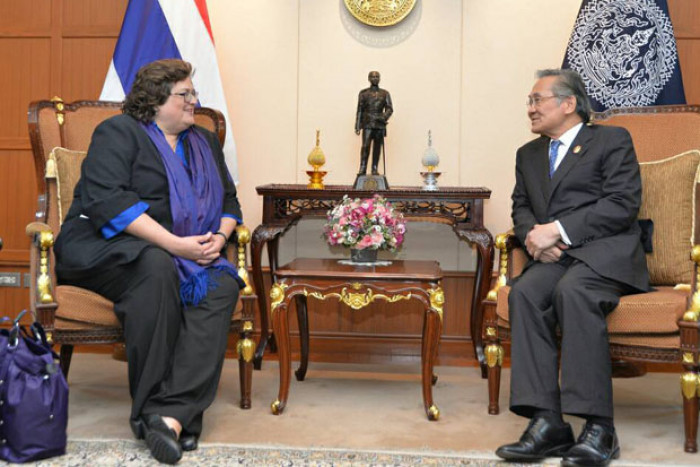The Bangkok Post And The Fight For Transgender Equality In Thailand

Table of Contents
The Bangkok Post's Coverage of Transgender Issues: A Historical Perspective
Early Reporting and its Tone
Early reporting on transgender issues in The Bangkok Post, predating the widespread awareness and acceptance of transgender identities, often reflected prevailing societal biases. The language used frequently categorized transgender individuals using outdated and potentially stigmatizing terminology.
- Examples of early coverage: Articles focused primarily on the sensational aspects of transgender lives, often neglecting nuanced discussions of identity, rights, and lived experiences. Many lacked sensitivity and promoted harmful stereotypes.
- Analysis of language and framing: Early articles frequently used terms like "ladyboys" or other colloquialisms that failed to recognize the diversity within the transgender community. The framing of stories often centered on the "exotic" or "other" aspects of transgender identity, rather than highlighting human rights concerns.
Evolution of Coverage Over Time
Over the years, The Bangkok Post's coverage of transgender rights has demonstrably evolved. The shift towards more inclusive and supportive reporting is noticeable, mirroring broader changes in societal attitudes and increased awareness of LGBTQ+ issues globally.
- Examples of shifts in journalistic approach: More recent articles prioritize human-interest stories, focusing on the individual experiences of transgender individuals, highlighting their resilience, and showcasing their contributions to Thai society.
- Campaigns and events prompting changes: Significant events such as Pride parades, legal challenges related to transgender rights, and increased advocacy by LGBTQ+ organizations have likely influenced The Bangkok Post's more nuanced and sensitive approach.
Comparison to Other Media Outlets
Compared to other Thai media outlets, The Bangkok Post's coverage, while not without its flaws, has generally demonstrated a comparatively progressive approach. While some smaller publications might offer more specialized and in-depth reporting on transgender issues, The Bangkok Post's wider reach potentially makes its portrayal of the Thai transgender community more influential in shaping national discourse on media representation in Thailand.
The Impact of The Bangkok Post's Reporting on Public Perception
Shaping Public Opinion
The Bangkok Post's reporting has undoubtedly shaped public opinion on transgender rights in Thailand. Its choice of language, framing of stories, and the prominence given to certain narratives can significantly influence how transgender individuals are perceived by the broader population.
- Examples of impactful articles: Articles focusing on the struggles faced by transgender individuals, highlighting discrimination, and advocating for legal reforms have likely contributed to increased public empathy and awareness. Conversely, less sensitive articles could inadvertently reinforce harmful stereotypes.
- Evidence of changing public perception: While quantitative data on public opinion is limited, anecdotal evidence and increasing visibility of transgender individuals in Thai society suggest a gradual shift towards greater acceptance, at least among certain segments of the population.
Influence on Policy and Legislation
While direct causation is difficult to prove, The Bangkok Post's reporting has likely played a role, albeit indirect, in influencing government policies and legislation related to transgender rights in Thailand. By highlighting the struggles and needs of the transgender community, the newspaper has potentially put pressure on policymakers to address these issues.
- Instances where articles may have influenced policy decisions: The newspaper's reporting on transgender healthcare access, legal gender recognition processes, and discrimination in employment could have indirectly influenced policy debates and legislative reforms.
- Analysis of advocacy or criticism: The newspaper's stance on specific laws and policies, whether through direct editorials or news coverage, can sway public opinion and thereby exert indirect pressure on the legislative process.
Challenges and Limitations in Reporting on Transgender Equality
Sensitivity and Accuracy
Reporting sensitively and accurately on transgender issues is crucial. Misunderstandings or misrepresentations can perpetuate harmful stereotypes and cause real-world harm to the transgender community.
- Potential pitfalls in reporting: Using incorrect pronouns or names, relying on outdated terminology, or focusing solely on sensational aspects of transgender lives are all significant pitfalls. Lack of consultation with the transgender community itself is another key concern.
- Best practices for sensitive reporting: Journalists must prioritize using inclusive language, conducting thorough research, consulting with experts and members of the transgender community, and verifying information before publication. Prioritizing respect for their identities and autonomy is paramount.
Censorship and Self-Censorship
The Thai media landscape is subject to certain constraints. While outright censorship might be less prevalent than in some other countries, self-censorship, driven by a desire to avoid conflict with authorities or advertisers, remains a possibility affecting coverage of sensitive social issues.
- Examples of potential censorship or self-censorship: Specific articles critical of government policies or societal attitudes regarding transgender issues may be suppressed or softened to avoid repercussions.
- Influence of the media landscape: The complex relationship between the media and the government, as well as the potential for economic pressures, can influence the scope and tone of reporting on controversial topics like transgender equality.
Conclusion
The Bangkok Post's role in the fight for transgender equality in Thailand is complex and multifaceted. While its coverage has demonstrably evolved towards greater inclusivity and sensitivity, challenges remain. The newspaper's influence on public perception, its potential impact on policy, and the ongoing need for accurate and sensitive reporting underscore the importance of continued critical engagement with its coverage. The fight for transgender equality in Thailand requires ongoing dialogue and a commitment to inclusive media representation. We must continue to critically analyze media portrayals, support responsible reporting, and advocate for legislation that protects the rights of transgender individuals. Further research and discussion on transgender equality in Thailand are needed to ensure a more just and equitable future for the Thai transgender community. Let's continue the vital conversation surrounding transgender equality in Thailand.

Featured Posts
-
 How Trumps Executive Orders Affected Transgender Rights And Well Being A Community Perspective
May 10, 2025
How Trumps Executive Orders Affected Transgender Rights And Well Being A Community Perspective
May 10, 2025 -
 Bondi Announces Record Breaking Fentanyl Seizure
May 10, 2025
Bondi Announces Record Breaking Fentanyl Seizure
May 10, 2025 -
 Mark Zuckerbergs Facebook In The Age Of Trump
May 10, 2025
Mark Zuckerbergs Facebook In The Age Of Trump
May 10, 2025 -
 Wynne And Joanna All At Sea A Comprehensive Guide
May 10, 2025
Wynne And Joanna All At Sea A Comprehensive Guide
May 10, 2025 -
 Florida Transznemu Not Tartoztattak Le A Noi Mosdo Illegalis Hasznalata Miatt
May 10, 2025
Florida Transznemu Not Tartoztattak Le A Noi Mosdo Illegalis Hasznalata Miatt
May 10, 2025
